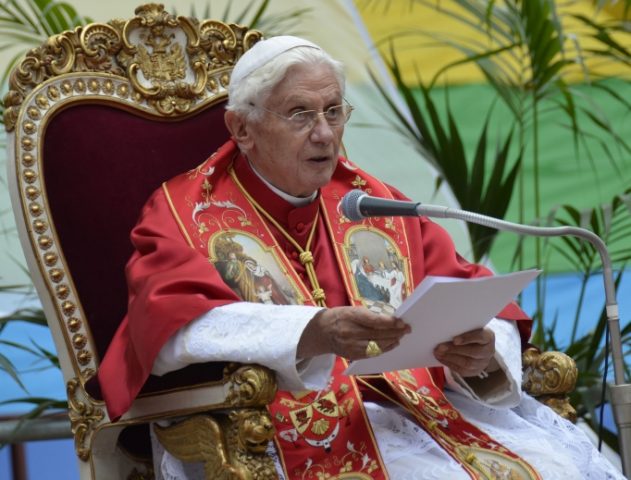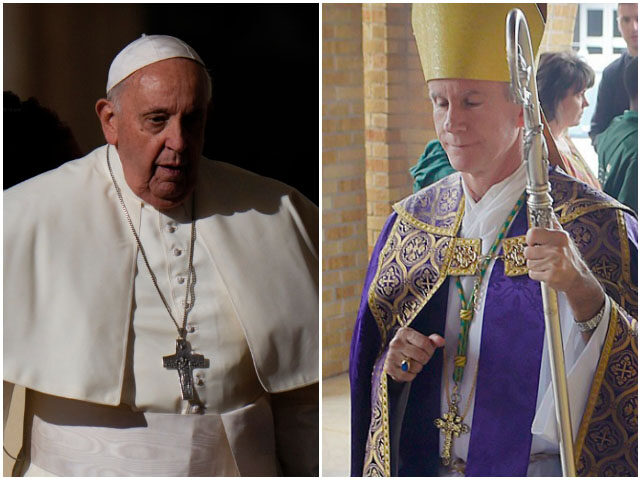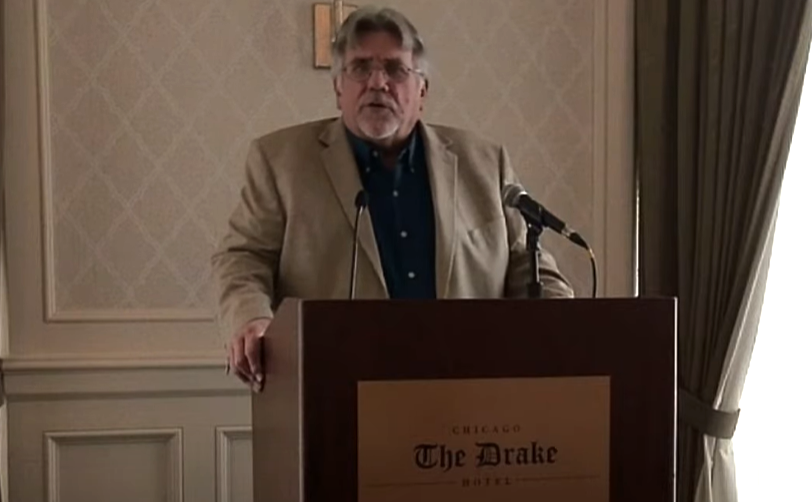Pope Emeritus Benedict Is Right: The Sexual Revolution Is Part of the Problem, by Jennifer Roback Morse

BREAKING: Missouri Governor Signs Ban on Aborting Babies With Beating Hearts, by Calvin Freiburger
May 25, 2019
President Trump Issues New Rule to Protect Conscience Rights of People Who Oppose Abortion, by Micaiah Bilger
May 25, 2019
Pope Benedict addresses the World Meeting of Families 2012.
COMMENTARY: So let’s be part of the solution.
By Jennifer Roback Morse, National Catholic Register, 5/24/19
Pope Emeritus Benedict wrote an extended essay on the clergy sex-abuse and cover-up scandal, where he cited the sexual revolution coming of age in Europe in 1968 as a contributing factor.
Some critical commentators thought Benedict’s attention to the sexual revolution was misplaced. Some, such as seasoned reporter and Vatican watcher Christopher Altieri, observed that the problem preceded the sexual revolution. Some say the problem is bigger than sexual morality. And to be perfectly honest, some want to say that the problem is anything but the sexual revolution and/or anything but homosexuality.
I’m willing to concede that clergy sexual abuse didn’t start in 1968 and that the clergy sexual-abuse crisis has many other important facets.
In spite of this, however, I maintain that the sexual revolution really is a significant factor. I will go further. We will not get a full grip on this problem until we confront the toxic ideology of the sexual revolution and the damage it has done.
And yet I fully sympathize with the desire to set it aside. Let me explain.
In my decades of studying the family as a social institution, I have developed a profound respect for traditional Christian sexual morality. The major premise that animates all my work is that children need their parents and are ordinarily entitled to a relationship with them.
Traditional Christian sexual morality protects children’s legitimate interests in a relationship with both parents, in the stability of their parents’ union and, indeed, even in knowing the identity of their parents. I am a passionate opponent of the sexual revolution, which tears down this structure.
In 2013, I thought to myself, the sexual revolution is demonstrably wrong. This ideology must be harming people and racking up victims. Why not address this fact head-on?
I began compiling a list of victims and survivors of the sexual revolution. I considered including victims of sexual abuse. I thought to myself pretty much what Altieri said about clerical sexual abuse: “There have always been people who would sexually abuse children. Sexual abuse has always been with us: It is not fair to blame that on the sexual revolution. Besides, I’ve got 45 million children of divorce, 70% of divorces having a reluctant partner, 500 million heartbroken career women and an unknown number of frozen embryos to worry about. I’ve got enough to do.”
And to be honest, I didn’t really want to deal with sexual abuse. The subject is repulsive. Any excuse to avoid it would be excuse enough.
But as the revelations of the #MeToo movement erupted over movie mogul Harvey Weinstein’s decadeslong pattern of predation, along with the revelations about former Cardinal Theodore McCarrick, I changed my opinion.
I conclude that the sexual revolution is gravely culpable. I could no longer avoid the subject in good conscience.
This culpability stems from the fact that the sexual revolution is based fundamentally on one deeply flawed idea: “Sex is an entitlement. Every person is entitled to an unlimited amount of guilt-free, problem-free, child-free sex.” This is now called being “sex positive.” Our whole society has reorganized itself to institutionalize and buttress this concept.
This sense of entitlement emboldens sexual predators and disarms their victims. Honestly, who really believes they are entitled to sex? Only a predator believes that. The revolution produced a steady public diet of rationalizations and justifications that empowers the already powerful.
And the potential victims have been robbed of social support for a chaste default position of “No way am I doing that!” Instead, being sexually active becomes the default position. The person who wants to abstain is the person who must offer an account of himself or herself — as if chastity and not promiscuity were the real problem in society.
Pope Benedict’s observations about sexual education in the schools is directly relevant here. Children received the message from trusted authority figures that sex is a harmless recreational activity. What Father Joseph Ratzinger observed in Germany as a young priest has only gotten worse. Some modern critics of sexual-education curriculum just flat out call it sexual grooming.
I am convinced that we are not going to get anywhere unless we jettison the premises of the sexual revolution. If you aren’t convinced, look at the #MeToo movement, which grew up in response to the sexual-harassment revelations about serial predator Weinstein. Women in pink hats were trying to fight sexual predation. But they did not want to give up being “sex positive.” They were, and mostly still are, hanging on to their pills and pornography and abortions and all the rest. They are counting on some combination of legal procedures and periodic public shaming to protect women from abuse by powerful men. This is self-evidently a lost cause.
In the Catholic Church, we do have a problem with “clericalism.” We dohave undue deference to the clergy by the laity, which inhibits us from challenging authority figures when we should. We do have a climate in the Church whereby some clergy suffer from an undue lust for and abuse of power. We do need better accountability structures and more attention to Church governance.
At the same time, we undeniably have a serious problem with out-of-control homosexual clergy using the priesthood as their private playground. We have a numerically smaller but still important problem with priests abusing and harassing women and girls. And we have a general problem with bishops and religious superiors covering up these problems.
The problem of clergy sex abuse and cover-up is deeply rooted and multifaceted. Getting to the bottom of it, rooting it out, healing the victims, punishing the guilty and preventing further crimes is the work of the entire Church, for a lifetime or more. There is more than enough room for multiple approaches and emphases. This is no time for “either-or” thinking. This is precisely the time for “both-and” thinking.
Exposing and rooting out the false premises of the sexual revolution is an indispensable part of that task. Catholics are in the best position to get that all-important job done. We need to do it for ourselves, as well as for the rest of society. And that is why I, for one, am grateful for Pope Emeritus Benedict’s essay.
Jennifer Roback Morse, Ph.D., is the founder and president of the Ruth Institute.




